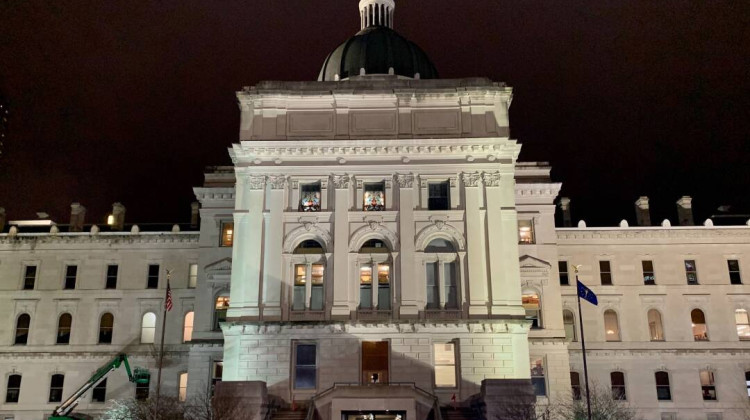
The new law directs departments with at least 12 full-time staff serving areas of at least 20,000 people to adopt a merit board by 2025.
Liz West/FlickrPolice and firefighter advocates argue politics can creep into public safety departments’ hiring, promotion and discipline decisions when elected local officials have unilateral control over personnel.
Some communities put those decisions in the hands of a merit board to make the process more “fair.”
A new law, HEA 1016, will soon push more Indiana communities to adopt such boards.
Professional Firefighters Union of Indiana Vice-President Mike Whited told lawmakers in testimony on HEA 1016 that merit boards ensure fairness.
“We want the best possible police officers and firefighters to be hired,” Whited said. “We want the best possible police officers and firefighters to be promoted to these positions, not [a person] who helps somebody on a campaign or who's a fishing buddy with somebody else.”
Steven Orusa of the Indiana Fire Chiefs Association testified that by ensuring qualified people are hired and promoted, merit boards also help keep firefighters safe.
“Having worked in a department whose chief didn't have the basic officer certification and experienced a line of duty death, I can tell you it makes a difference,” Orusa said. “We believe that firefighters have a right to have some input into those that lead and serve them in harm's way.”
The new law directs departments with at least 12 full-time staff serving areas of at least 20,000 people to adopt a merit board by 2025. That includes municipal departments and departments in fire districts or territories, but excludes volunteer departments.
The duties of merit boards can vary, but they often don’t choose who to hire or promote directly. Instead, they are responsible for overseeing and approving such decisions by officials, ensuring that minimum certification requirements and other qualifications are met. They might also be responsible for drafting or approving disciplinary procedures or other similar processes within the department.
“So you have the freedom in your authority of having jurisdiction to create merit rules that fit what you want,” said Orusa.
Orusa is also chief of the Fishers Fire Department, which already has a merit board in place. His appointment by the Fishers mayor as chief was not subject to approval by the merit board, he said, per the city’s rules. But other promotions or hires into other ranks like lieutenant and captain do require approval by the board.
“My merit board will meet twice this year. Once they'll meet to ratify a promotional list and then they'll meet to ratify the hiring list,” Orusa said. “And since those lists are good for 24 months, that's the only reason they'll need to meet. Unless, of course, there's a discipline issue.”
The boards can be very involved in disciplinary proceedings. Indianapolis’ police merit board, for example, conducted hearings in 2018 after police shot and killed an unarmed man. The board ultimately voted to clear the two officers involved and maintain their employment.
Join the conversation and sign up for the Indiana Two-Way. Text "Indiana" to 73224. Your comments and questions in response to our weekly text help us find the answers you need on statewide issues.
The law sets merit boards in cities, towns, counties or other municipal units to have five members: two people (one from each political party) selected by police or fire department staff, two people (also of each party) selected by the mayor or equivalent head of local government, and one person selected by elected councilors or commissioners.
The guidelines are slightly different for departments in fire districts or territories: the board that governs the district or department can appoint its own members to the merit board, still alongside members chosen by department staff.
HEA 1016 also directs merit boards to meet monthly. But, the law gives communities the ability to create their own guidelines by vote.
That could result in a board being more or less active (like Fishers’ biannual fire merit board meetings) or having more or less people (like Indianapolis' seven member police merit board). No matter the number of board members, however, state law does require at least a third to be selected by department staff.
At least 95 fire departments meet the minimum size requirements set in the law, according to a state fiscal analysis of the law. Only about a third of those departments already have a merit board. The analysis was unable to nail down how many police departments will be affected, but the Indiana Fraternal Order of Police also supported the new law.
Accelerate Indiana Municipalities (AIM), the state’s association of cities and towns, opposed the law during its journey through the legislature. Government Affairs Director Jenna Bentley said it infringes on communities' right to decide what’s best for themselves.
“AIM is not taking a position on whether or not a merit system is the best option for communities, but rather AIM opposes changing how the decision to establish a merit system is made locally,” Bentley said. “For us, it really comes down to accountability for those members who have decided not to have a merit system. Local elected officials, including mayors and city and town councils, are held accountable by voters for public safety. That's why we have elections.”
The new law does allow communities to opt out of creating a merit board by the 2025 deadline. But it is not exclusively up to local elected officials. A majority of the local police or fire department’s staff have to vote against creating the board too.
It gets easier to dissolve the board once it has been created. Rather than requiring a majority vote from both department staff and elected officials, either can vote to dissolve the board alone — even if the other votes to keep it.
Bentley argued that makes it too hard for elected officials to make decisions.
“Really what this bill does is flips the process on its head,” she said. “Even if a legislative body wanted to keep their [merit board] in place, they couldn't do it if the public safety group decided to opt-out.”
To ensure communities don’t end up with a merit board they don’t want, HEA 1016 requires all communities that create a new merit board because of the law to vote on whether to keep their board five years later.
Another law regarding firefighter personnel was signed this year. HEA 1025 simply extends statewide disciplinary procedure rules that already apply to municipal fire departments to fire protection districts and territories. The procedures do not apply to volunteer departments.
Adam is our labor and employment reporter. Contact him at arayes@wvpe.org or follow him on Twitter at @arayesIPB.
9(MDAyMzk1MzA4MDE2MjY3OTY1MjM5ZDJjYQ000))
 DONATE
DONATE








 Support WFYI. We can't do it without you.
Support WFYI. We can't do it without you.